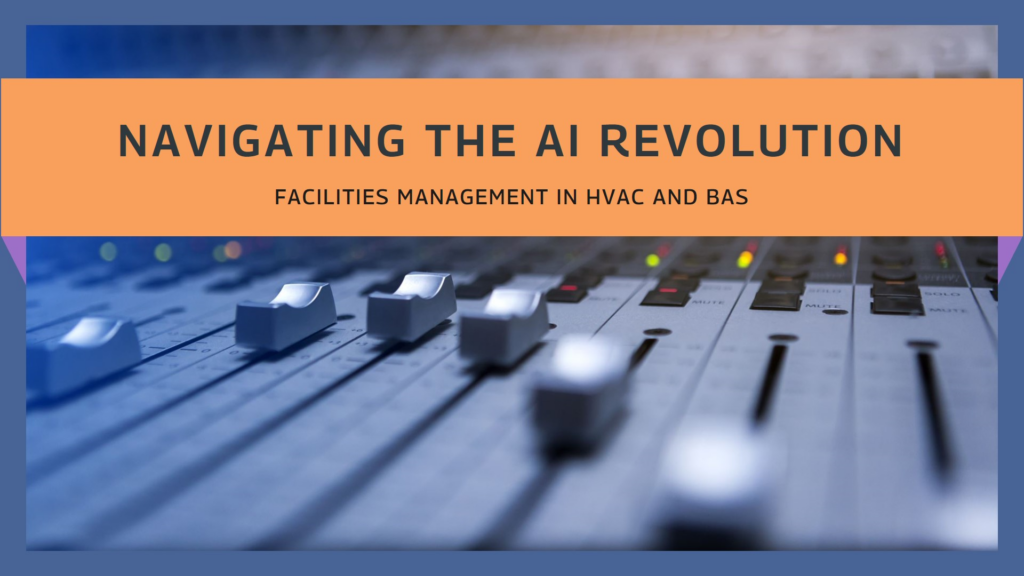Artificial intelligence (AI) has ushered in a new era of possibilities in the ever-evolving landscape of facilities management. AI is poised to revolutionize how we manage and optimize our built environments, particularly in the realms of Heating, Ventilation, and Air Conditioning (HVAC) and Building Automation Systems (BAS). However, as with any technological advancement, it is crucial to approach AI integration with a strategic mindset and a focus on practical applications.
The Promise of AI in Facilities Management
AI offers a wealth of potential benefits for facilities managers, including:
- Predictive Maintenance: AI algorithms can analyze vast amounts of data from sensors and equipment to predict potential failures before they occur, minimizing downtime and costly repairs.
- Energy Optimization: AI-powered systems can continuously monitor and adjust HVAC and BAS settings to optimize energy consumption, reducing costs and environmental impact.
- Occupant Comfort: AI can learn occupant preferences and adjust environmental conditions accordingly, creating a more comfortable and productive workspace.
- Enhanced Security: AI can analyze video feeds and other security data to identify potential threats and automate responses, improving overall building security.
Navigating the AI Landscape: A Practical Approach

While the potential of AI is undeniable, it is essential to approach its implementation with a pragmatic and results-oriented mindset:
 Focus on Fundamentals
Focus on Fundamentals
Before diving into AI, ensure that our facilities management team has a strong foundation in HVAC and BAS systems fundamentals. This includes understanding the underlying principles of operation, maintenance, and troubleshooting. Mastering the basics of software engineering, data management, and problem-solving will also provide a solid groundwork for integrating AI.
 Identify Pain Points
Identify Pain Points
Rather than blindly adopting AI for innovation, pinpoint the specific pain points in our current operations. These could include recurring maintenance issues, inefficient energy usage, or occupant complaints. AI should be a tool to address specific challenges, not a solution in search of a problem.
 Start Small and Scale
Start Small and Scale
Begin with pilot projects that address specific challenges. This allows us to test and refine AI solutions before deploying them on a larger scale. Starting small helps manage risks and provides opportunities to learn and adjust strategies as needed.
 Invest in Data Infrastructure
Invest in Data Infrastructure
AI thrives on data. Ensure that our organization has the necessary infrastructure to collect, store, and analyze relevant HVAC and BAS systems data. Robust data infrastructure is crucial for AI to function effectively and deliver meaningful insights.
 Collaborate with Experts
Collaborate with Experts
Partner with AI specialists and technology providers who understand the unique needs of facilities management. Their expertise can guide us through the implementation process and ensure optimal results. Collaborating with experts helps leverage the latest advancements in AI and apply them effectively to our operations.
Adapting to the AI Revolution
As AI continues to advance, it is crucial for facilities management professionals to adapt and embrace the change. This includes:
- Continuous Learning: Stay informed about the latest AI developments and their potential applications in facilities management. Keeping up-to-date with industry trends and technological advancements is essential.
- Upskilling: Invest in training and development programs to equip our team with the skills needed to work with AI-powered systems. Building expertise within the team ensures we can manage and maintain AI solutions effectively.
- Data Literacy: Develop an understanding of data analytics and how it can be used to gain insights from AI-generated data. Data literacy is fundamental for interpreting AI outputs and making informed decisions.
- Openness to Change: Embrace a continuous improvement mindset and be willing to adapt our processes and workflows as AI becomes more integrated into facilities management. Flexibility and adaptability are key to successful AI integration.
Conclusion
The future of facilities management is intertwined with the rise of AI. By taking a proactive and practical approach to AI integration, we can harness its power to optimize operations, reduce costs, and enhance the overall experience of building occupants. Let us embrace this technological revolution as an opportunity to elevate our profession and create a more efficient, sustainable, and comfortable built environment for all.
Sources and Related Content
- 5 Ways AI is Being Used to Improve Security: Threat Detection and Intelligence
- Does AI Represent a New Era for Facilities Management?
- How AI Is Used in Predictive Maintenance
- How Artificial Intelligence is Revolutionizing HVAC Systems
- Navigating AI Model Deployment: Challenges and Solutions
- The Future of Facility Management: Industry Trends for 2024
- The Hidden Power of AI: Maximizing Profits and Streamlining Processes in Commercial HVAC
- The Power of AI Data Analytics
- What Impact Will AI Have on Facility Management?
By following these principles and leveraging the insights provided, we can ensure a positive and impactful integration of AI in our careers and the facilities we manage.
#AIinFacilitiesManagement #HVAC #BAS #SmartBuildings #FutureOfWork #FacilitiesManagement



